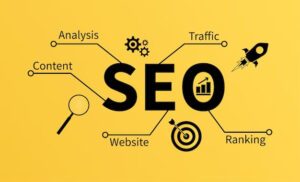The internet is a vast digital landscape, and getting noticed can be like searching for a needle in a haystack. This is where Search Engine Optimization (SEO) comes into play. But what exactly is website SEO, and why is it so important? In this article, we’ll explore the world of SEO, break it down into simple terms, and understand why it’s a critical element for the success of any website.
Defining SEO: The Basics
SEO, or Search Engine Optimization, is the practice of enhancing a website’s visibility on search engines like Google, Bing, and Yahoo. It involves optimizing various elements of a website to improve its ranking in search engine results pages (SERPs). The primary goal of SEO is to increase organic, non-paid traffic to a website, attracting more visitors who are actively searching for the information, products, or services that the site provides.
Key Components of Website SEO
1 ) Keyword Research: At the heart of SEO lies keyword research. This process involves identifying the words and phrases that your target audience is likely to use when searching for content related to your website. These keywords act as the foundation for your SEO strategy.
2 ) On-Page SEO: On-page SEO refers to optimizing individual web pages to improve their ranking and visibility. This includes optimizing content, headings, meta tags, and URLs to make them more search-engine-friendly.
3 ) Off-Page SEO: Off-page SEO focuses on activities that take place outside of your website to enhance its authority and credibility. This includes strategies like building backlinks from reputable websites and social media marketing.
4 ) Technical SEO: Technical SEO involves optimizing the technical aspects of a website to improve its crawlability and indexability by search engines. This includes improving site speed, ensuring mobile-friendliness, and creating an XML sitemap.
5 ) Content Creation: High-quality, relevant content is a fundamental element of SEO. It not only provides value to your audience but also helps search engines understand your website’s relevance to particular keywords.
The Importance of SEO
Now that we have a basic understanding of what SEO is, let’s delve into why it’s crucial for any website:
1 ) Increased Visibility: When someone searches for information, products, or services related to your website, you want to ensure your site appears prominently in the search results. SEO helps improve your website’s visibility, making it more likely to be seen by potential visitors.
2 ) Organic Traffic: SEO is a strategy for attracting organic traffic, meaning people who find your website through search engine results rather than through paid advertising. Organic traffic is often more valuable, as it tends to consist of users genuinely interested in your content or offerings.
3 ) Improved User Experience: Effective SEO not only optimizes for search engines but also enhances the user experience. This includes ensuring your website loads quickly, is easy to navigate, and offers valuable content.
4 ) Credibility and Trust: Websites that appear at the top of search results are often viewed as more credible and trustworthy by users. Achieving a high ranking through SEO can help establish your website as an authoritative source.
5 ) Cost-Effective Marketing: Compared to many traditional advertising methods, SEO is cost-effective. It provides a sustainable way to drive traffic to your site without ongoing advertising expenses.
6 ) Competitive Advantage: In a digital world filled with competitors, SEO can give you a competitive edge. When your website ranks higher than others in your niche, you are more likely to attract visitors and potential customers.
7 ) Adaptation to Changing Algorithms: Search engines continually update their algorithms, which can impact your website’s ranking. SEO is an ongoing process that allows you to adapt to these changes and stay competitive in the search results.
8 ) Audience Targeting: Through keyword research, you can specifically target the audience looking for what you offer. This means you’re more likely to attract visitors who are genuinely interested in your content, products, or services.
Conclusion:
Website SEO is not just about appeasing search engines; it’s about creating a better online experience for your audience. By optimizing your website for search engines, you make it easier for users to find your content and engage with your brand. SEO is an ever-evolving field, and staying up to date with best practices is essential for maintaining your website’s relevance and success in the digital landscape. So, if you’re looking to improve your website’s visibility, credibility, and user experience, embracing SEO is the way to go.





